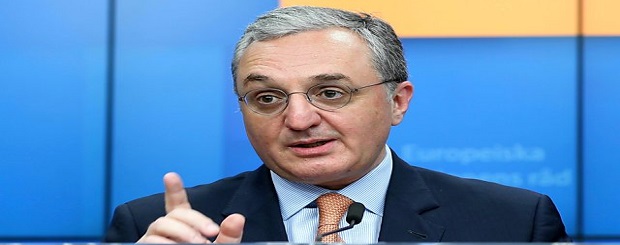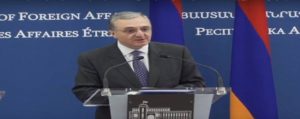
Medieval blockade of Armenian borders by Turkey violates international agreements: Mnatsakanyan
23 September, 2020
For three decades, Turkey has kept Armenia’s land border closed, denying Armenia the right to access the sea. This medieval blockade cannot be justified either from the point of view of reason or from the point of view of international law, since it directly violates not only the relevant international conventions, traditional law, but also international agreements. As Armenpress was told in the Department of Media and Public Diplomacy of the Armenian Foreign Ministry, Armenian Foreign Minister Zohrab Mnatsakanyan said this at the ministerial online meeting on the topic “Cooperation aimed at the earliest possible implementation of the Vienna Action Plan to achieve sustainable development goals for developing countries that have no way out to the sea”.
The meeting, chaired by Kazakh Foreign Minister Mukhtar Tleuberdi, was attended by UN Secretary General Antonio Guterres, Chairman of the 75th session of the UN General Assembly Volcan Bozkir, UN High Representative for the Least Developed Countries, Landlocked Developing Countries and Small island developing states Utoikamanu Fekitamoyeloa, foreign ministers of about 20 countries and heads of international organizations
In his speech, Foreign Minister Mnatsakanyan touched upon the new challenges facing landlocked countries in the face of the novel coronavirus, noting that landlocked developing countries face greater obstacles to sustainable, inclusive growth within the framework of global restrictions. In the context of international cooperation in the fight against the latter, in order to mitigate the consequences of the epidemic for landlocked countries, the Armenian Foreign Minister stressed the importance of the Vienna Action Plan and the launch of a roadmap for its accelerated implementation.
“In this year of global disasters, tremendous hardships, worries and fears, the international community has a historic opportunity to lay the foundation for meaningful change and the best possible recovery. The risks associated with the novel coronavirus have shown that effective response and recovery efforts require a focus on tackling inequality, discrimination and lack of inclusion, otherwise these gaps are likely to widen.
It is important that, in addition to the damage done by the epidemic, we also capture existing obstacles to development: blockades and unilateral coercive measures are detrimental to sustainable development and run counter to response and recovery. They undermine not only regional development, but also peace and security.
For three decades, Turkey has denied Armenia the right to access the sea by closing Armenia’s land border. This medieval blockade cannot be justified either from the point of view of reason or from the point of view of international law, since it directly violates not only the relevant international conventions, traditional law, but also international agreements.
Armenia is fully committed to effective multilateral cooperation aimed at global, international and regional development. We continue to view inclusive cooperation between landlocked and transit countries as a key precondition for removing political barriers to the free movement of people, goods and services, and for the effective realization of the economic, social and other rights of all peoples.
The promotion of human rights, fundamental freedoms, gender equality and integration, as well as the strengthening of democratic values are priorities for Armenia, based on the understanding that human rights are universal for all parts of the world, all peoples and individuals, regardless of place of residence or status.
Ensuring a human rights-based and anthropocentric approach continues to be a priority in the response to rehabilitation efforts, and Armenia is fully committed to this. Strengthening human resources and the perception of national talent as a driving force for intellectual development defines the essence of reforms and rehabilitation programs in Armenia, with a particular emphasis on information and communication technologies, promotion of innovation and ICT development. The latter are important as an effective tool for reducing costs, facilitating access to foreign markets, thereby contributing to the growth of foreign trade, ”the Armenian Foreign Minister noted.
Concluding his speech, Zohrab Mnatsakanyan reaffirmed Armenia’s commitment to effective multilateral cooperation in support of the Vienna Action Plan and the six priority areas of the Roadmap for its accelerated implementation.

armenpress.am/rus/news/1028578.html
